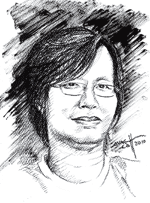The year 2011 has arguably been Burma's most interesting and significant year in decades. It began like so many others—with little hope of real change, despite plans to transfer power to an ostensibly civilian government following discredited elections held in late 2010—but ends with many now believing the country is finally on the road to irreversible reforms.
It is still too early to tell if Burma's prospects are really as promising as they seem: We have seen too many false starts in the past to completely abandon our well-founded doubts about our rulers willingness to change their ways. But if we look back over the past year, it's difficult to escape the impression that we may well be witnessing something new.
Perhaps the first sign that things were about to improve came at the end of March, when Snr-Gen Than Shwe officially ended his tenure as one of the world's most repressive dictators. Even though it is widely assumed that he still calls many of the shots from the shadows, his departure from the national political stage was welcome nonetheless, if only because he had so long been the face of military rule in Burma.
 |
Kyaw Zwa Moe is managing editor of the Irrawaddy magazine. He can be reached at [email protected].
|
Than Shwe's successor, President Thein Sein, was not exactly a new face himself, but at least the ex-general and former junta prime minister does not seem to bear any personal animosity toward Aung San Suu Kyi, the leader of Burma's pro-democracy movement. After some tentative trips outside Rangoon early in the year to test the limits of her newfound freedom following her release from house arrest in November 2010, Suu Kyi finally met Thein Sein in Naypyidaw in August, and came away convinced that he was someone she could deal with.
As if to cement his image as a more moderate and pragmatic leader than his predecessor, at the end of September, Thein Sein did something nobody expected: He called for the suspension of work on the Chinese-backed Myitsone dam in northern Burma's Kachin State. This move won him the praise of Burmese activists and the general public, whose opposition to the US $3.6 billion project grew after a report was leaked detailing the potentially devastating impact it would have on Burma's longest river and the people who depended on it. It also attracted a positive response from the West, especially the US, because it showed that he was not afraid to risk displeasing Beijing, the former regime's closest ally for decades.
Less dramatically, but in the long run probably more significantly, the Thein Sein administration has also renewed efforts to reach ceasefire agreements with Burma's many ethnic armies. In some areas, it has had some success, although a lasting political solution to Burma's ethnic divisions remains as elusive as ever. And in country's north, where Burmese troops have been waging an offensive against the Kachin Independence Army since June, ending a ceasefire that had been in place since 1994, the situation has gone from bad to worse, taking a tragic toll on local civilians.
Early in the year, the idea of starting a second Panglong conference, modeled on the one held by independence leader Aung San in 1947 to bring Burma's ethnic minority groups into the Union of Burma, was floated by Suu Kyi and other opposition leaders. However, rather than pursuing this plan, which would have led to a direct confrontation with the new government, Suu Kyi seems to have shelved it for the time being. It will be interesting to see if it is revived in the coming year as a way to deal a problem that has vexed Burma for generations.
Aung San was also present in spirit at the first encounter between his daughter, Suu Kyi, and Thein Sein on Aug. 19. The two held talks under a large portrait of the father of Burma's armed forces, symbolizing the “potential common grounds to cooperate in interests of the nation and the people,” as the state-run New Light of Myanmar reported the next day.
Suu Kyi's own iconic image has also become a common sight in Burma, now appearing in print, on posters and even on massive billboards in Rangoon and elsewhere in the country. This is a testament not only to her own enduring popularity among ordinary Burmese, but also to the changed media climate since Thein Sein took power.

